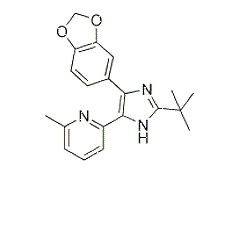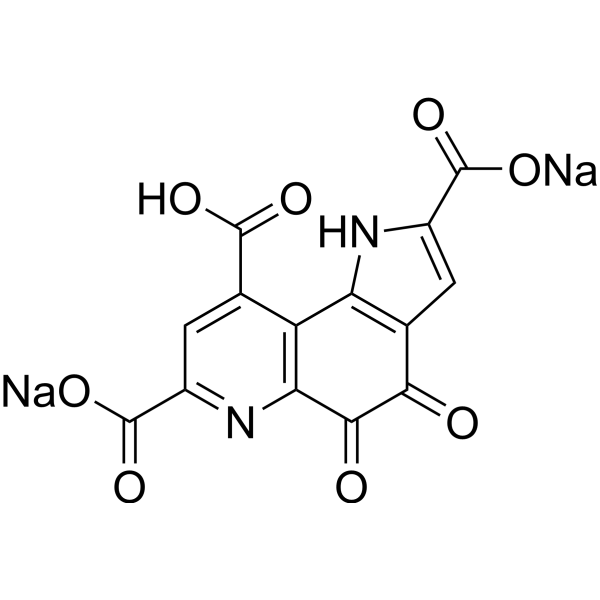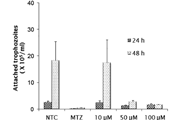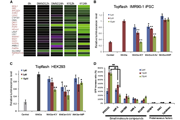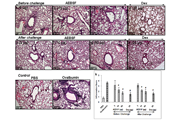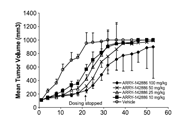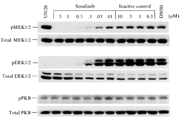-
生物活性
SB505124 (SB-505124)is a selective ATP competitive inhibitor of ALKs 4, 5 and 7 and the TGFβ pathway. SB-505124 is an inhibitor of activin receptor-like kinase (ALK-5). Selective inhibitor of transforming growth factor-β type I receptor (ALK5), ALK4 and ALK7 (IC50 values are 47 and 129 nM for ALK5 and ALK4 respectively). Selectively inhibits signaling from TGF-β and activin; does not inhibit other ALK family members. SB-505124 is demonstrated to suppress the action of transforming growth factor-B (TGF-B) both in vitro and in vivo.
Kinase activities
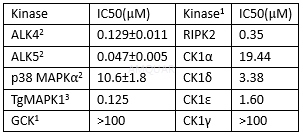
SB-505124inhibits the TGFβ induced phosphorylation of Smad2 in multiplecell lines with an IC50 value of ~0.25μM.[1]
Parasite growth inhibition of SB505124[3]

-
体外研究
-
体内研究
30% PEG400+0.5% Tween80+5% propylene glycol
-
激酶实验
In Vitro Protein Kinase Assay[2]
Kinase assays were performed with 65nM GST-ALK5and 184nM GST-Smad3 in 50mM HEPES, 5mM MgCl2, 1mM CaCl2,1mM dithiothreitol, and 3μM ATP. Reactions were incubated with 0.5μCi of [33P] γ ATP for 3 h at 30°C. Phosphorylated protein was captured on P-81paper, washed with 0.5% phosphoric acid, and counted by liquid scintillation.Alternatively, Smad3 or Smad1 protein was also coated onto FlashPlate SterileBasic Microplates. Kinase assays were then performed in Flash-Plates with sameassay conditions using either the kinase domain of ALK5 with Smad3 as substrateor the kinase domain of ALK6 (BMP receptor) with Smad1 as substrate. Plateswere washed three times with phosphate buffer and counted by TopCount.
p38 Kinase Activity[2]
p38 kinase activity was determined using ap38 MAPK assay kit according to the manufacturer’s protocol. Briefly,phospho-p38 was immunoprecipitated from 200μg of celllysates with an immobilized phosphor-p38 antibody overnight at 4°C. p38 kinaseactivity was measured using 2μg of ATF-2 fusion protein as the substrate with addition of 200μMATP. After 30-min incubation at 30°C, the reaction was terminated with Laemmlisample buffer, and the proteins were boiled and resolved by 10%SDS-polyacrylamide gel electrophoresis, transferred to nitrocellulose membrane,and immunoblotted with phospho-ATF-2 antibody.
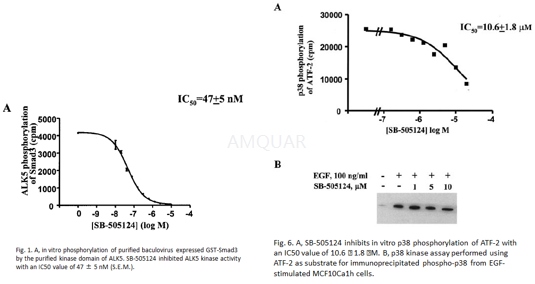
-
细胞实验
Cell culture and reagents[4]
Monolayer cultures of mesenchymal cellswere prepared from the wing buds of Hamburger-Hamilton (HH) stage 23/24 chickembryos. Briefly, wing bud cells were separated by digestion with 0.1% trypsinand 0.1% collagenase in Ca2+-Mg2+-free Hanks’s balanced salt solution for 10min at 37°C. Cells were pelleted at 350×g for 10 min and resuspended with Ham’sF12 medium supplemented with 10% fetal bovine serum (FBS) and antibiotics.Cells were filtered through eight layers of lens paper, and the monolayercultures were plated at 2×106 cells/60-mm culture dish. They were allowedto adhere for 1 h in a humidified atmosphere at 37°C with 5% CO2.The following biochemical agents were administered either alone or togetherwith staurosporine: PD98059; SP600125; SB505124; SIS3 and Akt inhibitor IV;SB203580; and TGF-β1, TGF-β2, and TGF-β3. The micromass culture was performed.Briefly, the concentration of a mesenchymal cell suspension was adjusted to2×107 cells/ml, and a 10-μl drop of this cell suspension was placedin a culture dish. After incubating for 1 h at 37°C and 5% CO2, F12medium containing 10% FBS was added to the culture.
Alcianblue staining and quantitation of chondrogenesis
To obtain the photomicrographs, micromasscultures were fixed with Kahle’s fixative for 20 min and then stained with 0.5%Alcian blue 8-GX in 0.1N HCl overnight. For quantitative analysis, cultureswere fixed with 2% glacial acetic acid solution in ethanol for 30 min and rehydratedby sequential incubation with 95 and 70% ethanol for 10 min each. Cells werethen stained with 0.5% Alcian blue overnight. After washing with 0.1N HCl threetimes, the bound dye was extracted with 4Mguanidine HCl overnight at 4°C. Theabsorption of the extracted dye was measured at 595nm using a microplate reader.
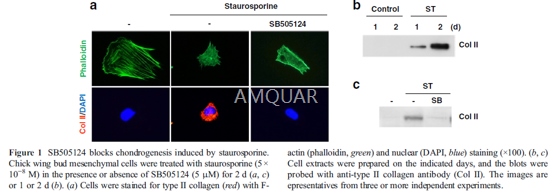
-
动物实验
SB505124 in vivo experiments[3]
C57Bl/6 female mice were infectedintraperitoneally with 103 freshly purified RH-GFP parasites in avolume of 200μl phenolred-free DMEM. Beginning 1 h post infection, mice received 10mg/kgSB505124 or DMSO alone intraperitoneally once daily. The drug had no apparenteffect on the health of the animals during this time course. On day 5post-infection, mice were sacrificed by CO2 asphyxiation and PECscollected in a 5ml PBS-lavage. Cells were washed, stained with anti-mouseAPC-conjugated CD45, and analyzed by flow cytometry using a FACSCaliburcytometer. 105 events were counted and subsequent analysis wasperformed using Summit. IFNc was measured using Mouse IFNc ‘Femto-HS’ High SensitivityELISA.
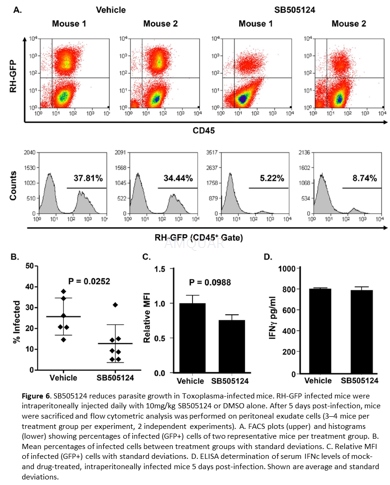
-
不同实验动物依据体表面积的等效剂量转换表(数据来源于FDA指南)
|  动物 A (mg/kg) = 动物 B (mg/kg)×动物 B的Km系数/动物 A的Km系数 |
|
例如,已知某工具药用于小鼠的剂量为88 mg/kg , 则用于大鼠的剂量换算方法:将88 mg/kg 乘以小鼠的Km系数(3),再除以大鼠的Km系数(6),得到该药物用于大鼠的等效剂量44 mg/kg。
-
参考文献
[1] Vogt J, Traynor R, Sapkota GP. The specificities of small molecule inhibitors of the TGFss and BMP pathways. Cell Signal. 2011;23(11):1831-1842.
[2] DaCosta Byfield S MC, Laping NJ, Roberts AB. SB-505124 is a selective inhibitor of transforming growth factor-beta type I receptors ALK4, ALK5, and ALK7. Mol Pharmacol. 2004;65(3):744-752.
[more]
分子式
C20H21N3O2 |
分子量
335.4 |
CAS号
694433-59-5 |
储存方式
﹣20 ℃冷藏长期储存。冰袋运输 |
溶剂(常温)
|
DMSO
100 mM |
Water
<1 mg/mL |
Ethanol
|
体内溶解度
约8 mg/mL
-
Clinical Trial Information ( data from http://clinicaltrials.gov )
注:以上所有数据均来自公开文献,并不保证对所有实验均有效,数据仅供参考。
-
相关化合物库
-
使用AMQUAR产品发表文献后请联系我们





